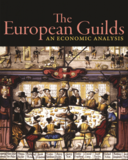Professor Sheilagh Ogilvie
I grew up in the western Canadian city of Calgary, and have since lived in Scotland, Germany, England, the USA and the Czech Republic. I studied at the Universities of St Andrews, Cambridge, and Chicago, and was a Research Fellow at Trinity College Cambridge. I then taught for 31 years in the Faculty of Economics at the University of Cambridge, before moving to the Chichele Professorship of Economic History at All Souls College Oxford in 2020.
Research Interests
I explore the lives of ordinary people in the past and try to explain how poor economies get richer and improve human well-being. I’m particularly interested in how social institutions – the formal and informal constraints on economic activity – shaped economic development in Europe between the Middle Ages and the present day. In recent years my publications have analysed guilds, serfdom, communities, the family, gender, human capital investment, consumption, and state capacity.
Featured Publication
In the Media
In our Time: The Hanseatic League, in discussion with Melvyn Bragg
“The Dark Side of Human Institutions: A Conversation” with Mark Penningon
“Consumer Protectors or Greedy Monopolists?”, Interview with Paul Seabright
Human Capital and Economic Outcomes in a European Developing Economy
“What a 16th Century Guild Teaches Us About Competition”, Planet Money interview with Adam Davidson
Sheilagh Ogilvie discusses consumption regulations in early modern Germany
Sheilagh Ogilvie on consumption and regulation of women’s activities in early modern Germany
Current DPhil Students
Zhao Dong (Department of Economics, University of Oxford)
Christoph Hess (University of Cambridge)
Sandra Ujpetery (University of Cambridge)
I would like to hear from potential DPhil students who are interested in doing research on pre-modern economies and institutions.
Teaching
Graduate Papers:
Institutions and Economic Growth in Historical Perspective
What Happened and Why?
Academic Writing and Seminar Skills





